Iron and Erectile Dysfunction: Can Deficiency Affect Performance?
Written by Dr. Deepali Anand

Dr. Deepali is a medical writer and healthcare professional with a background in clinical surgery and patient care. Having transitioned from active clinical practice to medical communications, she specializes in bridging the gap between complex clinical data and patient education. Dr. Deepali is dedicated to creating evidence-based content that is grounded in scientific rigor and empathy, ensuring that sensitive topics like sexual wellness and mental health are accessible and empowering for every reader.
•
October 29, 2025
Our experts continually monitor the health and wellness space, and we update our articles when new information becomes available.

Quick Read
Yes, low iron can contribute to erectile dysfunction, though it doesn't directly cause it. Iron deficiency disrupts oxygen delivery, weakens blood flow to the penis, lowers testosterone levels, and causes fatigue, all of which can impair sexual function. The good news is that this type of ED is often reversible through iron supplementation, dietary changes, and lifestyle improvements. If you're experiencing both erectile issues and symptoms like constant tiredness or weakness, getting your iron levels tested is a smart first step. Remember, balance matters-too little or too much iron can affect sexual health, so always work with a doctor before starting supplements.
Low iron erectile dysfunction may not be a phrase you hear often, but the two can be more connected than most people realize. While low iron doesn’t directly cause erectile dysfunction, it can set off a chain reaction, from poor oxygen delivery and low energy to hormonal imbalance, that affects how the body achieves and maintains an erection.
In this article, we’ll explore how iron deficiency impacts blood flow, testosterone, and sexual stamina; the medical tests that confirm the condition; and safe, effective ways to restore your levels naturally.
Allo asks
Did you know iron levels can affect erections?
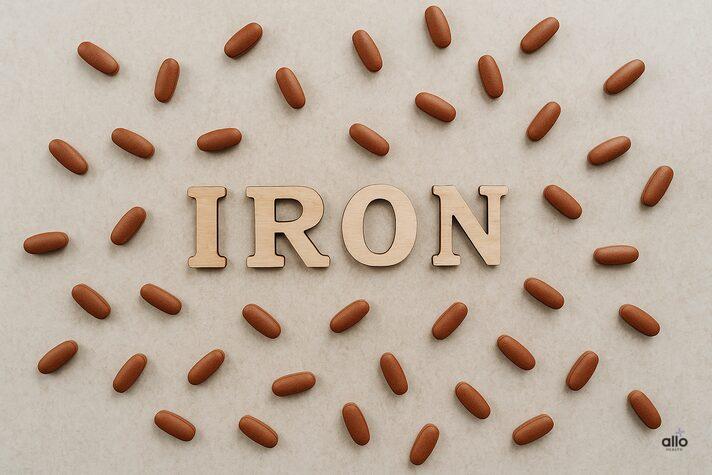
Can Low Iron Cause Erectile Dysfunction?
Low iron and erectile dysfunction aren’t often discussed together, but research shows they can be connected. While low iron doesn’t directly cause erectile dysfunction, iron deficiency can disrupt several pathways that are crucial for healthy sexual function.[1]
Iron plays a key role in producing hemoglobin, the protein in red blood cells that carries oxygen to every part of the body.[2] When iron or hemoglobin levels drop, oxygen flow weakens, and because erections depend on strong blood flow, this can affect sexual performance and stamina.
In addition to supporting blood flow, iron helps with energy production, hormone regulation, and red blood cell formation, all of which influence libido and erection strength.[2] Men with low hemoglobin and sexual performance issues often find that restoring iron levels improves their overall energy and confidence.
According to Allo Health, every 1 in 2 patients has ED, which is based on our internal clinical data of more than 2.5 Lakh patients who come to our clinic.
Let’s take a closer look at how iron deficiency and erectile dysfunction may be linked
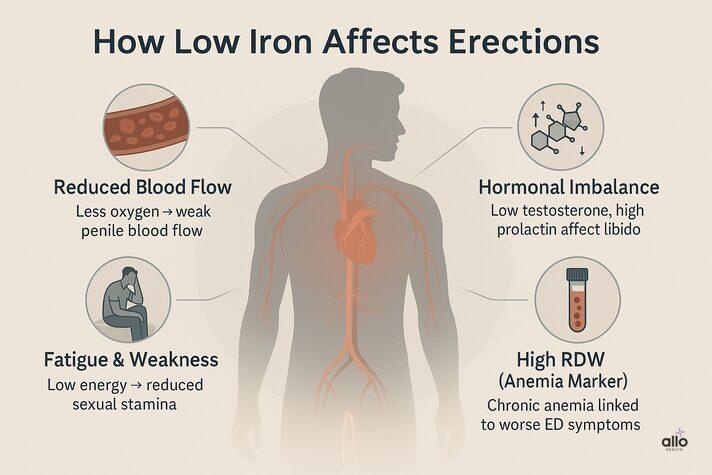
Link Between Low Iron and Erectile Dysfunction
Low iron levels can affect erectile function in several interconnected ways:
1. Reduced Blood Flow and Oxygen Delivery
Low iron → poor oxygenation → weak blood flow → erectile difficulties
When iron levels drop, the body produces less hemoglobin- the protein in red blood cells that carries oxygen. Without enough oxygen, blood flow to tissues, including those in the penis, becomes weaker. This reduced oxygen supply makes it harder to achieve and maintain firm erections.
Oxygen is also essential for producing nitric oxide, a molecule that helps relax the muscles and blood vessels in the penis. Lower nitric oxide levels mean reduced blood flow, one of the key causes of erectile dysfunction linked to low iron.
2. Hormonal Effects
Low iron → lower testosterone + higher prolactin → hormonal imbalance → reduced sexual drive
Iron deficiency can interfere with testosterone production, a hormone vital for sexual desire and function. Animal studies show that iron-deficient males have significantly lower testosterone levels compared to healthy ones.[3]
In addition, low iron can increase prolactin levels, a hormone that, when elevated, suppresses thyroid hormone production. Thyroid hormonal imbalance may lead to low libido and erectile dysfunction over time.
3. Fatigue and Low Stamina
Fatigue → low energy + disrupted hormone signals → weak libido and erectile issues
One of the most common symptoms of iron deficiency is fatigue. When the body lacks iron, it struggles to transport oxygen efficiently, causing tiredness and weakness. This directly impacts sexual desire, energy, and erection quality.
Fatigue also affects the hypothalamus–pituitary–gonadal axis, the brain’s signaling pathway that controls testosterone production, leading to further hormonal disruption.
4. Reduced Dopamine Levels
Low iron → low dopamine → reduced sexual interest and performance
Dopamine is essential for good erections. Iron is essential for producing the “feel-good” neurotransmitter(dopamine) that drives pleasure and motivation. The enzyme tyrosine hydroxylase, which helps make dopamine, requires iron to function.[4]
When iron is deficient, dopamine levels drop, leading to low mood, poor motivation, and decreased sexual desire, all of which can contribute to erectile dysfunction.
5. Higher red cell distribution width (RDW)
Iron deficiency anemia → high RDW → stronger link to erectile dysfunction
Chronic iron deficiency can lead to iron deficiency anemia, where the blood contains abnormally sized red blood cells. A high red cell distribution width (RDW), a marker of this imbalance, has been linked to ED severity.
In fact, one study[5] found that men with erectile dysfunction had significantly higher RDW values compared to those without ED, suggesting that prolonged iron deficiency could predict worsening ED symptoms.
What to Do If You Have Low Iron Erectile Dysfunction
Many people overlook deficiency-related erectile dysfunction, assuming it’s only caused by stress or aging. But if you’re experiencing ED along with symptoms of low iron, it’s important to get checked by a doctor.
See a Doctor If You Notice:
- Loss of morning erections
- Low sexual desire combined with fatigue or low mood
- Weakness, shortness of breath, or feeling unusually tired
- Pale skin, dizziness, or frequent headaches
Medical Tests to Confirm Iron Deficiency
Your doctor will likely recommend a few simple blood tests to check your iron status and related markers:
Ferritin Test:
The most accurate test for measuring stored iron. Levels below 30 μg/L usually indicate iron deficiency.
Complete Blood Count (CBC):
Checks hemoglobin and hematocrit levels. According to the WHO, anemia in men is defined as hemoglobin below 130 g/L.
Serum Iron, Transferrin Saturation, and Total Iron-Binding Capacity (TIBC):
These help confirm the diagnosis if ferritin results are unclear.
If you’re dealing with erectile issues and constant fatigue, it’s worth checking your iron levels. Sometimes what looks like a performance problem is actually a simple nutrient imbalance that can be fixed.
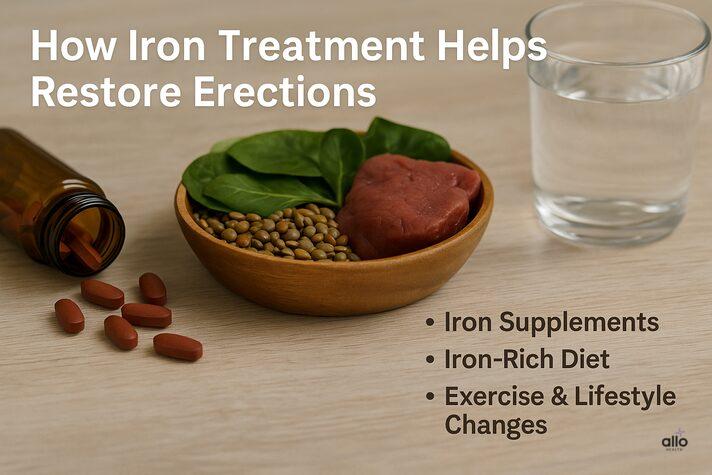
Treatment of Iron Deficiency-Related Erectile Dysfunction
If low iron is contributing to your erectile dysfunction, the good news is that it’s treatable. Once the underlying deficiency is corrected, many men experience noticeable improvements in erection quality and libido.
Iron Supplementation
The standard treatment for iron deficiency is oral iron supplementation.
- Ferrous sulfate is the most commonly recommended form.
- The usual therapeutic dosage ranges from 50–100 mg of elemental iron, taken three times daily for adults.
- Some doctors may prescribe 60–120 mg daily to reduce side effects such as constipation or stomach discomfort.
Always take iron under medical supervision, as excessive intake can lead to toxicity or interfere with the absorption of other nutrients.
Lifestyle Changes
Combining medical treatment with healthy lifestyle habits can greatly enhance recovery. Try these approaches to support both iron levels and erectile function:
- Regular exercise: Boosts blood circulation and stimulates red blood cell production.
- Stress management: Lower cortisol levels help maintain healthier testosterone levels.
- Balanced diet: Include iron-rich foods such as spinach, red meat, lentils, and fortified cereals.
- Stay hydrated: Proper hydration improves oxygen transport and blood flow.
If symptoms persist after treating the iron deficiency, there may be another underlying cause for the ED, such as cardiovascular disease or diabetes.
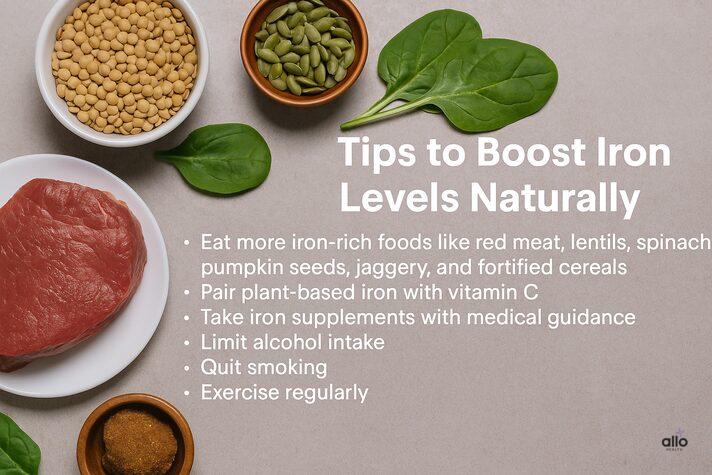
Tips to Boost Iron Levels Naturally
- Eat iron-rich foods: Add red meat, lentils, spinach, pumpkin seeds, jaggery, and fortified cereals to your meals.
- Pair with vitamin C: Combine plant-based iron with vitamin C (like lemon, amla, or oranges) to boost absorption.
- Take supplements wisely: Use iron tablets only under a doctor’s guidance to avoid side effects.
- Cut down on alcohol: Drinking less helps improve iron absorption and blood flow.
- Quit smoking: It damages blood vessels and reduces oxygen flow needed for erections.
- Stay fit: Maintaining a healthy weight supports better circulation and hormone balance.
- Exercise often: Regular movement boosts energy, reduces stress, and improves blood flow.
- Sleep well: Good rest helps the body recover, balance hormones, and rebuild iron stores.
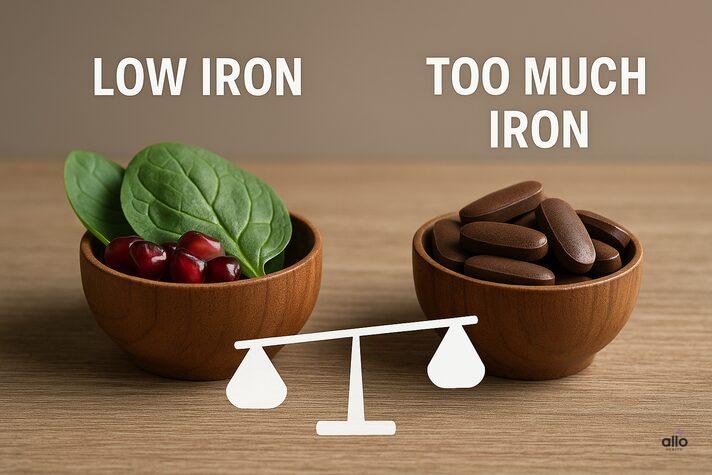
Can Too Much Iron Cause Erectile Dysfunction
Yes, having too much iron can worsen erectile dysfunction. This is why taking iron supplements without a confirmed deficiency is not advised.
- Hemochromatosis: A Genetic condition where the body absorbs too much iron. The extra iron can build up in organs like the testes and pituitary gland, lowering testosterone and reducing sexual desire or erection quality.
- Oxidative stress: High iron levels create harmful molecules that can damage nerves and make it harder for the muscles in the penis to relax, reducing healthy blood flow needed for erections.
Keeping your iron levels balanced is key. Too little or too much can affect energy, hormones, and erectile health. Always consult a doctor before taking supplements.
Bottom Line
Iron plays a key role in maintaining healthy blood flow, oxygen delivery, and hormone balance, all essential for sexual function. Low iron-related erectile dysfunction is real, as iron influences several pathways responsible for erections. The good news is that it’s reversible with proper treatment.
If you suspect iron deficiency is contributing to your ED, consult a qualified healthcare provider for an accurate diagnosis and guidance.
Disclaimer
The following blog article provides general information and insights on various topics. However, it is important to note that the information presented is not intended as professional advice in any specific field or area. The content of this blog is for general educational and informational purposes only. The content should not be interpreted as endorsement, recommendation, or guarantee of any product, service, or information mentioned. Readers are solely responsible for the decisions and actions they take based on the information provided in this blog. It is essential to exercise individual judgment, critical thinking, and personal responsibility when applying or implementing any information or suggestions discussed in the blog.
Most Asked Questions
Does low iron cause erectile dysfunction?
Low iron doesn’t directly cause erectile dysfunction, but it can contribute to it. Iron deficiency reduces oxygen flow, energy, and hormone balance, all of which affect erections. Once iron levels are restored, many men notice better stamina, improved mood, and stronger erections.
What happens to men with low iron?
Men with low iron may experience tiredness, weakness, dizziness, pale skin, shortness of breath, and reduced sexual desire. These symptoms occur because low iron limits oxygen delivery throughout the body, affecting both physical energy and sexual performance.
What is dangerously low iron?
Iron levels are considered dangerously low when ferritin drops below 30 μg/L or hemoglobin falls under 130 g/L (as per WHO standards for men). Such levels can lead to anemia, severe fatigue, and poor blood flow, conditions that may worsen erectile dysfunction.
How long does it take to recover from low iron?
Recovery time depends on the severity of the deficiency. With proper treatment and supplements, most men begin to feel better within 4 to 12 weeks, but full iron restoration may take 3 to 6 months. Consistent follow-ups and blood tests help ensure healthy recovery.
Can too much iron also cause erectile dysfunction?
Yes. Excess iron can create oxidative stress and damage blood vessels and hormones needed for erections. Conditions like hemochromatosis can cause iron buildup in the testes or pituitary gland, lowering testosterone and leading to erectile dysfunction. Always consult a doctor before taking iron supplements.
Sources
- 1.
Iron and a Man’s Reproductive Health: The Good, the Bad and the Ugly
- 2.
Iron
- 3.
Effects of Iron Supplementation on Testicular Function and Spermatogenesis of Iron-Deficient Rats
- 4.
Iron deficiency and sexual dysfunction in women
- 5.
The predictive value of red cell distribution width on erectile dysfunction


